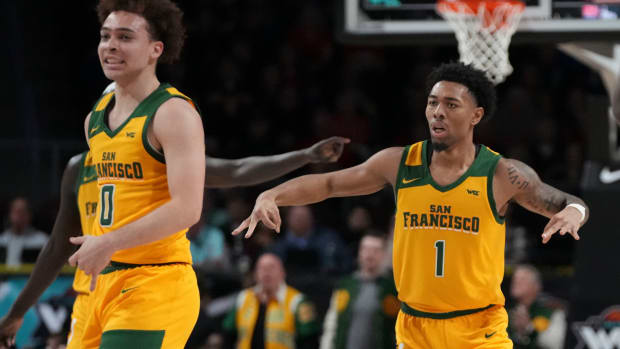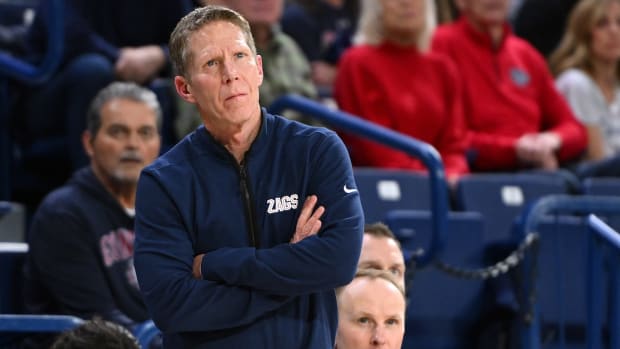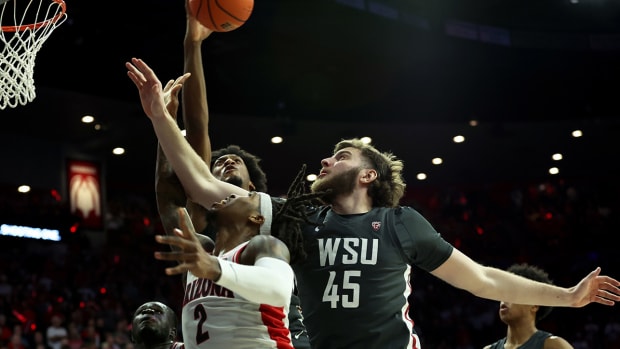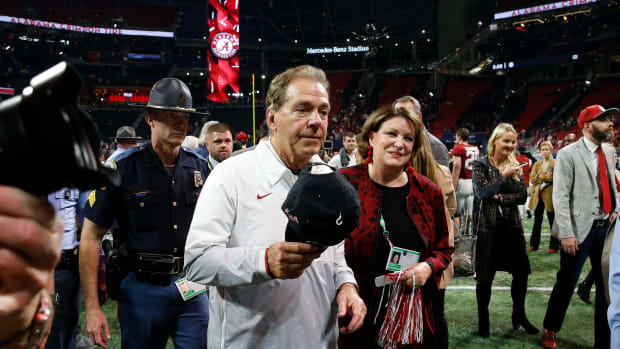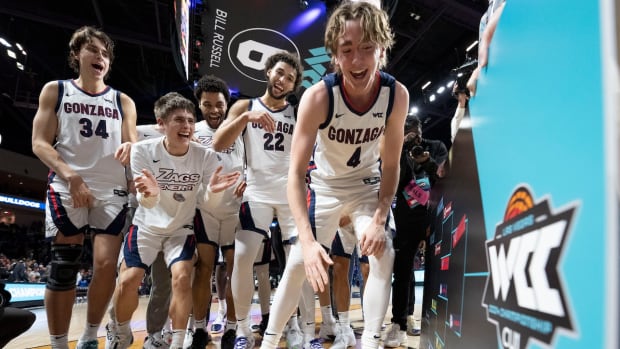The Read-Option: Breaking down college football's hype machine
Jadeveon Clowney is constantly generating discussion among college football pundits. [MCT/Sipa]
Why was Alabama the preseason No. 1 team in the country? Why should Jadeveon Clowney be considered a contender for the Heisman Trophy? Because we say so, that's why.
The hype machine is as big a part of college football as the games themselves; thanks to lofty preseason expectation from pundits -- and, yes, from fans -- we're often told who matters and why they matter without seeing a finished product. But why should hype shape the narrative of so many part of college football? Why can't fans and media members save judgment for what happens on the field?
Campus Union's Zac Ellis and Martin Rickman dive into the topic in this week's Read-Option.
Martin Rickman: We're in an age of hyperbole, it seems like. Nobody can be good, just okay, average, decent, serviceable, nice, great, cool or neat. Everyone has to be the best ever or the worst of all time. Think of the expectations! The hype machine works both ways, and although they're not the only ones guilty of it, ESPN's coverage of Jadeveon Clowney on Thursday night and the multiple-fronted campaign starting with the game and moving onto Mark May and Lou Holtz's sermonizing of Johnny Manziel are the most recent examples. Then we throw in Twitter and clickbait posts, and it seems like hype sells even better than sex these days. What's your take?
Zac Ellis: I think so much of it derives from a seemingly never-ending offseason where pundits and analysts, including us, have little to do but predict what's to come. Take preseason polls, for example. In essence, they are nothing but (usually) educated guesses as to what's next. They serve no on-field purpose; as coaches often bemoan, their entire existence is for the fans and to add to already hyped-up matchups. But when these games, or the highly touted players in them, don't live up to our expectations, often times we lay blame on the player. Sometimes it's warranted, and sometimes it's not. If we were to believe Twitter on Thursday night, then Clowney belonged on a D-III roster, having lost all hope for the Heisman Trophy. It was one game!
MR: And not only that, but it's a surface glance at a complicated issue. Clowney was doubled constantly and UNC spent a lot of energy on him. That's what a defensive playmaker can do. He can have an effect on the game even when his numbers aren't reflecting that. UNC spent so much time on Clowney their defense didn't pay enough attention to the run, their offense made mistakes, and even though they were picking up yards, they couldn't convert. It goes beyond YouTube highlights or sheer numbers. Clowney had an impact, even if he was gassed at the end of it all. But that's not 140 characters worth, so it's way easier to say Clowney is overrated or Clowney is out of shape or Clowney is regressing.
ZE: When all you hear about for Clowney is his of Michigan's Vincent Smith in the Outback Bowl last year, expectations are going to soar. That video was played over and over during the entire offseason (and right now through that link), and unfortunately for Clowney, each click on that YouTube highlight raises the bar for his junior season. So when Clowney goes out and suddenly looks human, and he somehow isn't trucking every UNC offensive lineman, for some reason people assume Clowney's talent doesn't live up to the billing. It's the same reason why Johnny Manziel would be a long shot to win the Heisman again, even without his offseason troubles: Last year, there were zero expectations for Manziel. He controlled the hype. This year, the world encourages the hype, and the expectations surrounding Manziel are sky-high.
MR: But why? Why does this happen? Why does the media feel the need to see things in binaries? Why can't there be a middle ground where we can enjoy the good plays, notice the bad ones and react accordingly?
ZE: I think that's a by-product of the world that we live in with "instant reactions" ... #hotsportstakes, if you will. If a player is going to be watched and covered, there needs to be some storyline or narrative flowing alongside his season. When a game suddenly doesn't match up with that narrative, like Clowney against UNC, the instant reaction is that Clowney isn't the player we thought he was. That may or may not end up as an accurate assessment of the player, but at the moment that's the readable, tweet-able narrative. I do think in Clowney's case, though, the media is not entirely to blame for the hype machine. NFL types have also been drooling over Clowney since last season, so the pros are just as accountable for the expectations, in my opinion.
MR: So what happens if Clowney goes out and has an incredible game against Georgia? Which narrative is it then? And what do we make of a player like Jameis Winston, whom I saw on Monday night. Everyone in the press box at Heinz Field was just in awe of what he was doing. Redshirt freshmen quarterbacks don't complete their first 11 passes in a conference game on the road on national television at night. They don't. Winston is likable, dynamic and talented. He's the type of player you gravitate towards because he is those things. If we're not careful, though, the media is going to ruin the fun of Jameis Winston quickly. Narratives serve a purpose; they let us attach meaning to a particular event or performance. But they can't overwhelm or take the place of the fact a person is a person or a team is a group of people, and no person or persons are defined by a singular narrative. This isn't an allegory or a fable, no matter how convenient it is to box someone into a particular trope.
ZE: The hype surrounding Winston may already be ruining him: On Tuesday he jumped from 35/1 odds to win the Heisman to 10/1 in Bovada's most recent rankings. In one single game, his first in college, Winston's supposed Heisman odds skyrocketed. And Winston's situation is even more intriguing than Clowney's, in some ways. Winston is a redshirt freshman and had never even played a collegiate game until Monday night. At least we had some sort of data for Clowney to expect similar results; Winston, on the other hand, was a clean slate, and yet somehow he managed to blow all expectations out of the water. As you said in your piece, freshmen don't complete 25 of 27 passes on the road in their first conference game. In this case, the hype machine proved correct, but how many others can we point to -- Jimmy Clausen of Notre Dame comes to mind -- who fall well short of what is expected in that same situation.
MR: The list is long and not just in college football. When you throw in guys who did do it in college and failed to be what everyone wanted them to be in the pros, it gets even bigger. I think hype is important in general. It gives players who deserve it a platform to share their talent with a wider base. It gets them more fans who weren't necessarily paying attention to them or their team before. Look at Buffalo's Khalil Mack, who I've written about a few times now. His performance against Ohio State in a loss had writers talking him up and bumped his NFL draft grade already from a possible second round grade to what people are projecting is a first round grade. That hype is great for the kid. But it's when hype becomes the expectation and the hype supplants reality that we run into trouble. And I think we need to slow down in general. Otherwise we'll sour some already great players.
ZE: Hype can absolutely be a good thing. Heck, I wrote a magazine piece during SI's preview week about out-of-nowhere Heisman candidates, such as Kent State's Dri Archer and BYU's Kyle Van Noy. These are guys who otherwise wouldn't get the same spotlight as a Manziel or Clowney, and that is the kind of attention smaller programs enjoy. But while I do believe the hype machine could take things down a notch, I'm not sure that's happening anytime soon. There's a reason a sport like college football is covered year-round, despite a three-month regular season: People read it. People want the coverage, and as along as people demand to know what to expect from Team A or Player B this season, the narratives will keep on coming.
MR:
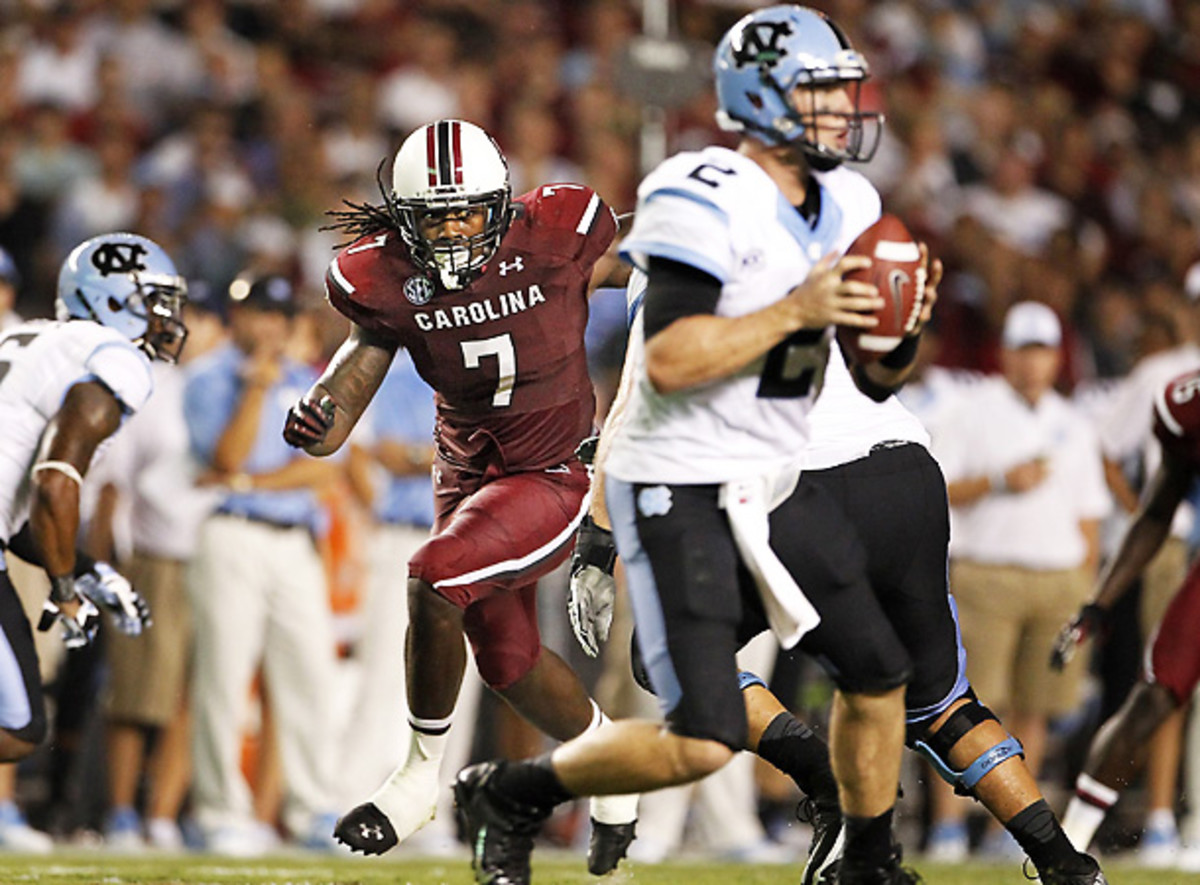
![Jadeveon Clowney is constantly generating discussion among football pundits. [MCT/Sipa]](https://www.si.com/.image/c_limit%2Ccs_srgb%2Cfl_progressive%2Cq_auto:good%2Cw_700/MTY4MjU5OTI4NDM1MDc0OTcz/image-placeholder-title.jpg)
